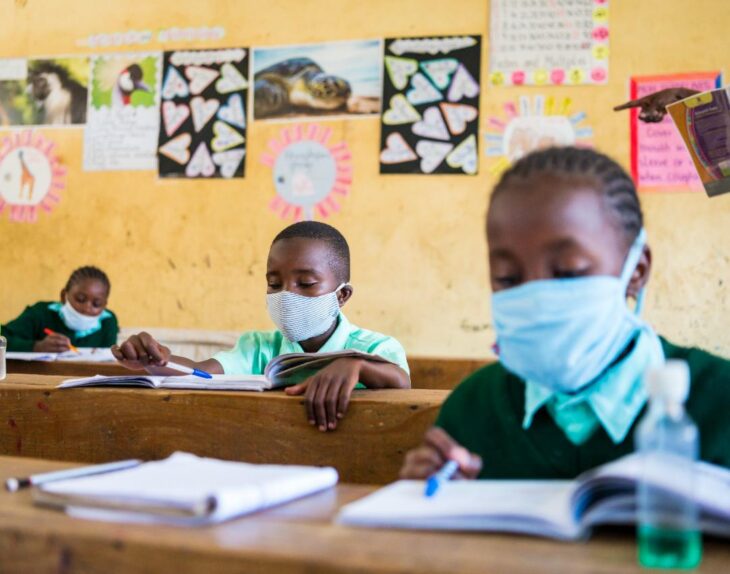NAIROBI,Kenya, Feb, 9 – During a tour of Machakos county while supervising the ongoing construction of classrooms for learners under the Competency Based Curriculum (CBC) at St Mary’s Mukunike high school in Kangundo, Education Cabinet Secretary Professor George Magoha condemned the ongoing ‘politicizing’ of the curriculum saying that it was here to stay.
Magoha said that no one will interrupt the ongoing implementation of the CBC as it is the future of the 21st century learner in Kenya.
Recently ANC party leader Musalia Mudavadi while on the campaign trail said that if elected he would revert to the old system of education, 8-4-4.
Education experts however say that the proposal by Mudavadi is unrealistic and will have devastating implications on over 5 million learners.
“Where it has reached now, the conversation that we need to have or need to continue to have is how do we identify the challenges that are emerging from its implementation and how do we troubleshoot them so that we keep improving as we go along. I don’t honestly think there is room to go back,” said Emmanuel Manias, Executive Director,Usawa Agenda.
“One gets 100 per cent another 75 per cent and another 5o per cent, so this one with 100 per cent teaches the rest until they understand. That is what competency is all about, CBC is learner centered,” said Magoha during previous interview.
The first CBC class will join grade seven or Junior secondary school in January 2023.
Many within the education sector say that making huge changes mid way through the system may not be the best solution particularly for learners.
“As we speak right now, more than 5 million Kenyan children are in it, by the time elections are held and they come into office, if they do there will be the first group that will be exiting primary school. by then we will have more than six million plus children in the system….so how do you scrap it, I think they are lying,” said Manias.
Already some Kenyans have taken the government to court over claims of disparity.
They argue that the system only amplifies the impact on some, especially the marginalised communities.
“Everywhere we go Kenyans say CBC is hurting them,” said Moses Wetangula, Ford Kenya party leader.
“CBC is here to stay, it is working globally,” said Magoha.
Teachers have raised new concerns while at the same time issuing demands to the Education Cabinet Secretary over the expected transition of students to grades seven and eight.
The Kenya Union of Post Primary Education Teachers (KUPPET) has come out firmly stating that the tutors are not well trained and schools are understaffed.
“We need to have very clear communication in terms of where CBC is domiciled.I think that decision was made that grade seven would be in secondary school. i don’t like the missed communication that is coming around saying that some primary schools will host grade seven. It was determined long ago and communicated that grade 7 would be hosted in secondary schools, so our efforts single minded on making our secondary schools ready for the double intake that will come next year,” said Manias.
The 8-4-4 system, which is being phased out has been criticised for being too broad, expensive and a burden to learners.
CBC Learning Structure
The 2-6-3-3-3 is tailored around seven core competencies which learners must have in one form or another have attained by the end of their learning.
They include: Communication and collaboration, critical thinking and problem solving, imagination and creativity, citizenship, digital literacy,learning to learn and self-efficacy.
It further recommends that learners should join institutions of learning at the early stages in pre-primary 1 at the age of four before proceeding to Pre-primary 2.
Learner will then proceed to primary school which has been graded and divided into lower and upper primary.
Lower primary will commence at grade 1, 2 and 3 while upper primary will begin in grade 4,5 and 6.
At this point in time, the CBC has been rolled out to grade 5. Learners will join grade 6 next year (2022) before joining secondary school.
It is worth noting that before proceeding to secondary school, learners will undertake a summative assessment at grade 6 that will be worth 40 marks. This will be combined with the initial 20 marks awarded in the formative assesement in grade 4,5 and even 6 totaling to 100 marks.
A criteria for transition from primary to secondary school is currently being developed.
Secondary School will be divided into junior and senior secondary school.
Junior Secondary School will consist of grade 7,8, and 9 while Senior Secondary School will consist of grade 10,11 and 12 which will be rolled out in 2028 completely phasing out the old education system.
Learners will undertake a national assessment at the end of grade 9 which will determine their placement in senior secondary school, in turn following their preferred career pathways.
Learners will make choices from a range of disciplines organized in three pathways and nine tracks based on their abilities, interests and career choices.
The pathways include: Science,Technology,Engineering and Mathematics(STEM), Social Sciences and Sports Science and Arts sciences. Each pathway has various subjects under it.
To fully master one’s skills/specialize, learners will then finally proceed to tertiary institutions (TVET, Colleges or Universities) for a couple of years depending with one’s course before joining the job market.
Stakeholders have meanwhile called for a re-organization of structures and programmes in universities to ensure they adequately cater to learners pursuing STEM courses as well sports and the performing arts in line with CBC guidelines.
Want to send us a story? Contact Shahidi News Tel: +254115512797 (Mobile & WhatsApp)


